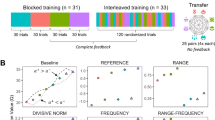Abstract
Conditional discriminative choice tasks can be arranged such that all correct choices yield the same reinforcer or such that each type of correct choice has its own unique reinforcer. The former is the traditional “Common Outcomes” Procedure; the latter is the “Differential Outcomes” Procedure. Use of this Differential Outcomes Procedure facilitates the rate of learning, increases the asymptotic level of performance, and enhances working-memory based performances in both animals and humans. These facts have stimulated many questions and experiments about learning and memory mechanisms and fostered potential applications.
Similar content being viewed by others
References
Brodigan, D.L., & Peterson, G.B. (1976). Two choice conditional discriminative performance of pigeons as a function of reward expectancy, prechoice delay, and domesticity.Animal Learning & Behavior, 4, 121–124.
Carroll, M.E., & Overmier, J.B. (2001).Animal research and human health: Advancing human welfare through behavioral science. Washington, DC: American Psychological Association.
Dunnett, S.B., Evenden, J.L., & Iversen, S.D. (1988). Delay-dependent short-term memory deficits in aged rats.Psychopharmacology, 96, 174–180.
Edwards, C.A., Jagielo, J.A., Zentall, T.R., & Hogan, D.E. (1982). Acquired Equivalence and distinctiveness in matching to sample by pigeons: Mediatino by reinforcer-specific expectancies.Journal of Experimental Psychology: Animal Behavior Processes, 8, 244–259.
Friedman, G. J., & Carlson, J.G. (1973). Effects of a stimulus correlated with positive reinforcement upon discrimination learning.Journal of Experimental Psychology, 97, 281–286.
Kruse, J.M., Overmier, J.B., Konz, W.A., & Rokke, E. (1983). Pavlovian CSs effects upon instrumental choice behavior are reinforcer specific.Learning and Motivation, 14, 165–181.
Linwick, D., Overmier, J.B., Peterson, G.B., & Mertens, M. (1988). The interaction of memories and expectancies as mediators of choice behavior.American Journal of Psychology, 101, 313–334.
Mahoney, J. (1992). Stimulus in-equivalence: reaction time as a measure of processing time between equivalence relations. Proceedings for the National Conferences on Undergraduate Research 1992, Vol 1. [Ashville, NC], 482–487.
Maki, P., Overmier, J.B., Delos, S., & Gutmann, A. (1995). Expectancies as factors influencing conditional discrimination performance of children.Psychological Record, 45, 1–27.
Miyashita, Y., Nakajima, S., & Imada, H. (2000). Differential outcome effect in the horse.Journal of the Experimental Analysis of Behavior, 74, 245–254.
Mowrer, O.H. (1947). On the dual nature of learning—a reinterpretation of “conditioning” and “problem-solving”.Harvard Educational Review, 17, 102–148.
Mowrer, O.H. (1956). Two-factor learning theory reconsidered, with special reference to secondary reinforcement and the concept of habit.Psychological Review, 63, 114–128.
Overmier, J.B. (1968). Differential Pavlovian fear conditioning as a function of the qualitative nature of the UCS: Constant versus pulsating shock.Conditional Reflex, 3, 175–180.
Overmier, J.B., Bull, J.A., & Trapold, M.A. (1971). Discriminative cue properties of different fears and their role in response selection.Journal of Comparative and Physiological Psychology, 76, 478–482.
Overmier, J.B., & Burke, P.D. (Eds.). (1992).Animal Models of Human Pathology. Washington, DC: American Psychological Association.
Overmier, J.B., & Lawry, J.A. (1979). Pavlovian conditioning and the mediation of behavior. In. G. Bower (Ed.),The Psychology of Learning & Motivation, Vol. 13. Pp 1–55. New York: Academic Press.
Overmier, J.B., Savage, L.M., & Sweeney, W. (1999). Behavioral and pharmacological analyses of memory offer new behavioral options for remediation. In M. Haug & R. Whalen (Eds.),Animal Models of Human Emotion and Cognition. Pp 231–245. Washington, DC: American Psychological Association.
Overmier, J.B., & Schwarzkoph, K.H. (1974). Summation of food and shock based responding.Learning and Motivation, 5, 42–52.
Peterson, G.B., Linwick, D., & Overmier, J.B. (1987). On the comparative efficacy of memories and expectancies as cues for choice behavior in pigeons.Learning and Motivation, 18, 1–20.
Rescorla, R.A. (1992). Associations between an instrumental discriminative stimulus and multiple outcomes.Journal of Experimental Psychology: Animal Behavior Processes, 18, 95–104.
Savage, L.M., & Langlais, P.J. (1995). Differential outcomes attenuates spatial memory deficits seen in pyrthiamine-induced thiamine deficiency in rats.Psychobiology, 23, 153–160.
Savage, L.M., & Parson, J.P. (1997). The effects of delay-interval, inter-trial interval, amnestic drugs, and differential outcomes on matching to position in rats.Psychobiology, 25, 303–312.
Savage, L.M., Pitkin, S.R., & Careri, J.M. (1999). Memory enhancement in aged rats: The differential outcomes effect.Developmental Psychobiology, 35, 318–327.
Savage, L.M., Stachfield, M., & Overmier, J.B. (1994). Effects of scopolamine, diazepam, and lorazepam on working memory in pigeons: An analysis of reinforcement procedures and sample problem type.Pharmacology, Biochemistry, & Behavior, 48, 183–192.
Sherburne, L.M., & Zentall, T.R. (1998). The differential outcomes effect in pigeons is not reduced by eliminating response-outcome associations: Support for a two-process account.Animal Learning & Behavior, 26, 378–387.
Thorndike, E.L. (1911).Animal Intelligence: Experimental Studies. New York: Macmillan.
Tolman, E.C. (1932).Purposive Behavior in Animals and Men. New York: Century.
Trapold, M.A. (1970). Are expectancies based upon different positive reinforcer events discriminably different?Learning and Motivation, 1, 129–140.
Trapold, M.A., & Overmier, J.B. (1969/1972). The second learning process in instrumental learning. Paper presented at Conference on Theory and Research Classical Conditioning, McMaster University, 1969. Appears in A.H. Black & W.F. Prokasy (Eds.),Classical Conditioning II: Current Theory and Research. (Pp 427–452). New York: Appleton-Century-Crofts, 1972.
Urcuioli, P.J., DeMarse, T. (1996). Associative processes in differential outcome discriminations.Journal of Experimental Psychology: Animal Behavior Processes, 22, 192–204.
Williams, D.A., Butler, M.A., & Overmier, J.B. (1990). Expectancies of reinforcer location as cues for a conditional discrimination in pigeons.Journal of Experimental Psychology: Animal Behavior Processes, 16, 3–13.
Author information
Authors and Affiliations
Corresponding author
Additional information
This paper is based upon presentations at the Pavlovian Society Annual Meeting, Annapolis, MD, September 2000.
Rights and permissions
About this article
Cite this article
Overmier, J.B., Linwick, D. Conditional choice-unique outcomes establish expectancies that mediate choice behavior. Integr. psych. behav. 36, 173–181 (2001). https://doi.org/10.1007/BF02734091
Issue Date:
DOI: https://doi.org/10.1007/BF02734091




